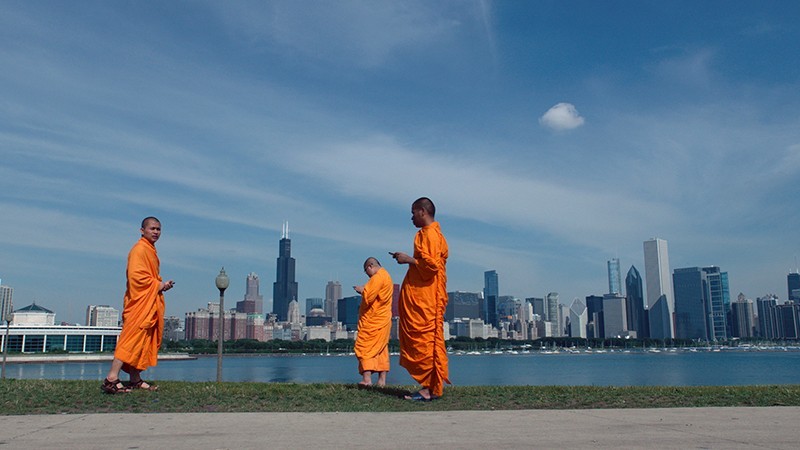In the last few years, Werner Herzog has become something of a comic icon, the hipster equivalent of that guy from the Dos Equis commercials. This is not entirely by his own doing, although films such Bad Lieutenant: Port of Call New Orleans imply he's in on the joke.
Do a quick Google search of his name and you'll find a plethora of videos in which Herzog surrogates provide a Bavarian accent and pseudo-Nietzchean commentary for everything from Mike Mulligan and his Steam Shovel to Pokemon Go. Though Herzog's awareness of this public image isn't entirely clear, he seems to enjoy indulging it. The idea of asking this self-confessed Luddite/hermit/technophobe to make a film about the internet — produced by a cybersecurity company — is a deliberate provocation, a chance to let his uncontrolled public image loose on a subject he barely acknowledges.
The internet in Herzog's Lo and Behold, Reveries of the Connected World doesn't have much in common with the one you use every day. You won't see the director googling his own name, catching up with Facebook friends or even checking out the comments on Fitzcarraldo on IMDB. Aside from a few passing references to Wikipedia and email, Herzog's highly selective view of the internet stays on the fringes, taking us around and under the usual path of technology with dizzying randomness.
It starts out benignly, with the director interviewing some scientists who developed the early ARPAnet, with footage of driverless cars and robots who can serve a cup of tea or play soccer. But he makes his real intentions clearer fewer than 30 minutes in, when a title card solemnly announces the third of Lo and Behold's ten chapters: The Dark Side.
From that point on, Herzog explores the digital world with all the subtlety of Sgt. Joe Friday interrupting a coffee-house reading of Howl, and the film becomes a Mondo Cane of the digital world. He talks to hackers, visits an isolated rehab center for video game addicts and meets people who suffer from an allergic reaction to radio waves. He speculates on the dangers of artificial intelligence, the possibility that electronic waves will create solar flares and destroy the earth, and expresses interest in Elon Musk's plans to colonize Mars. Herzog accepts every argument, receives every idea equally. At one point, he meets a family that was the victim of online bullying after their daughter died in an accident. The mother looks at the camera and flatly states "The internet is the antichrist." Herzog doesn't question it.
I will take a back seat to no one in my admiration for — no, make that unabashed love of — Jerry Lewis as a filmmaker, an actor and a humanitarian. So when I hear Max Rose, his first screen appearance in two decades, described as little more than a chance to pay tribute to a 90-year-old screen legend, my first response is, "What's wrong with that?"
Lewis plays the title character in Daniel Noah's film, a sad, tired man recently widowed after 60 years of marriage and tormented by the idea that his wife (played briefly but with charm by Claire Bloom) had been unfaithful. Rejecting the support of his family, he sulks and obsesses before finally finding the truth about the past. That's about all there is to the film, much of it confusing and abrupt.
Evidently subject to lengthy editing since it was first shown at Cannes three years ago, there are allusions to events and character details that appear to have been abandoned. The opening sequence tells us that Max was once a jazz pianist (his wife's infidelity is said to have taken place when he was out of town making his only record), yet this ends up having almost no bearing on anything on screen. Indications of problems between Max and his son (Kevin Pollak) rise up out of the blue when the film is half over. Abbreviated flashbacks and unclear shifts in time only add to the confusion.
In spite of all those faults, Max Rose has its modest charms, nearly all of them emanating from the deeply felt performance of its charismatic star. (There are also welcome but brief appearances by Mort Sahl and Dean Stockwell, and affectionate supporting work from Kerry Bishé as Max's devoted granddaughter.) It's Lewis' film from start to finish, and while much of it requires a complete repression of his comic side, both he and director Noah are smart enough to let a little bit of it slip in when he fumbles with a can opener, a moment that recalls one of his familiar stage bits. It's a throwaway, but it reminds us of what's hiding underneath both the character and the man playing him. The film is small, but has admirable sincerity.
Lewis will be appearing at the Family Arena on November 12 in a one-man show of recollections and film clips, sponsored by the St. Louis International Film Festival. Lewis' classic 1963 film The Nutty Professor will also be included in this year's festival, on a date to be announced shortly./p>


